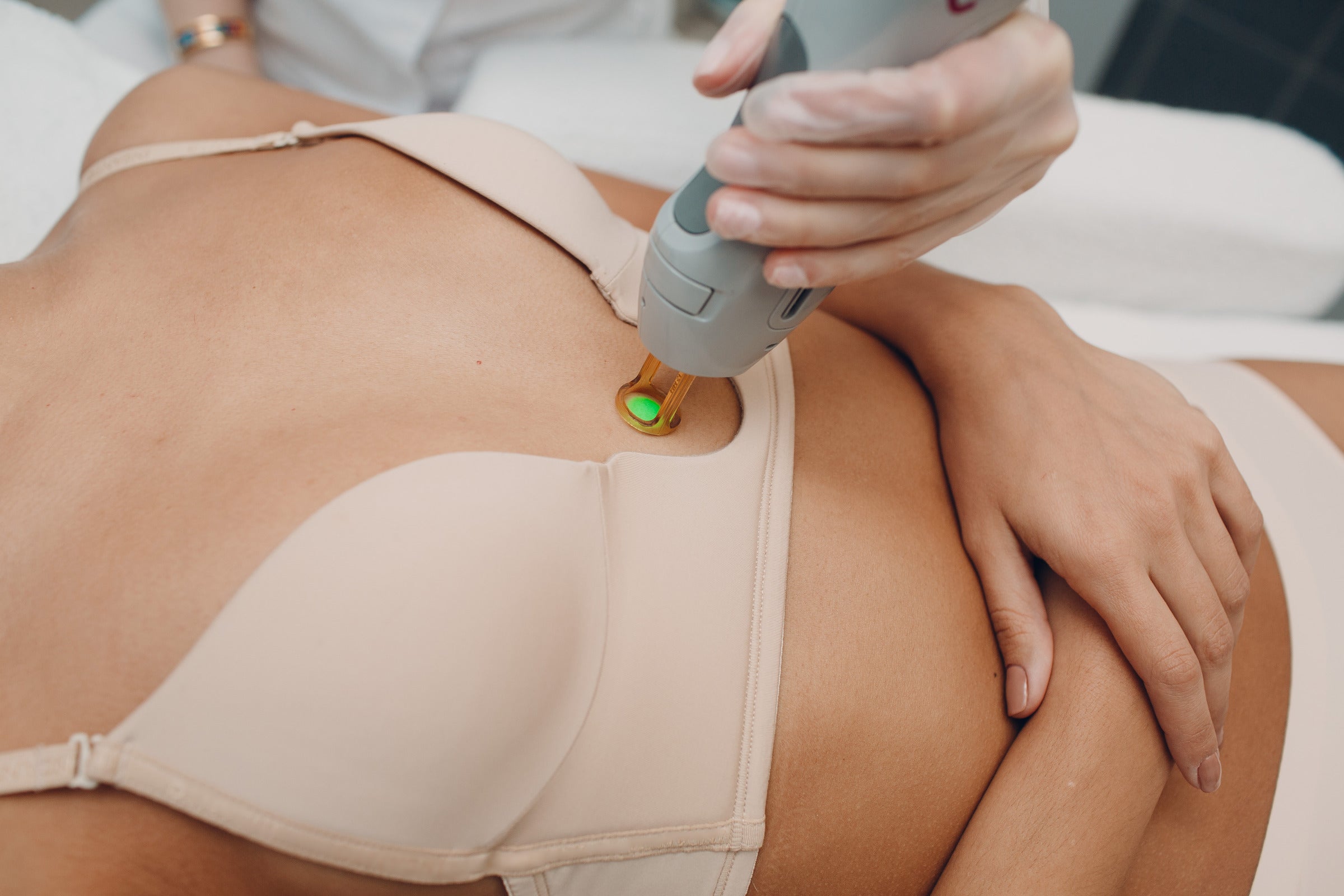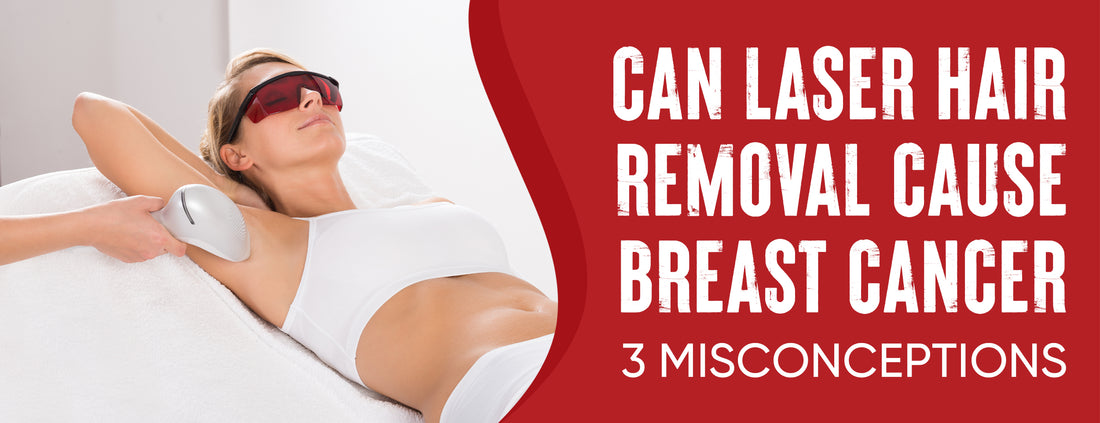There have been concerns about whether or not laser hair removal may cause breast cancer. A quick Google search of " breast cancer and non-invasive laser hair removal " brings up many articles, some suggesting a link between the two and others citing unsubstantiated claims.
Cancer cannot be caused by laser hair removal therapy. Lasers are specially designed to penetrate skin cells and target only hair follicles deep within the skin. Laser hair removal does produce a small amount of radiation.
This blog post will explore the relationship between laser hair removal and breast cancer, give you accurate knowledge of making an informed decision, and provide precise information to help you make informed decisions.
Can Laser Hair Removal Cause Breast Cancer: 3 Misconceptions

One often-circulated myth focuses on the connection laser hair removal has to breast cancer. We will explore this commonly misunderstood topic and examine scientific evidence to debunk this myth.
Misconception 1: Breast cancer increases with laser hair removal
One of the most persistent concerns about laser hair removal is the belief that the procedure increases the risk of breast cancer. This misconception likely stems from the use of lasers in mammography, a screening method for breast cancer. It's important to note that the laser used in mammography vastly differs from that used in hair removal.
Fact: No scientific evidence supports the claim that laser hair removal causes breast cancer. The American Cancer Society and other reputable medical organizations have stated that no conclusive evidence links laser hair removal to breast cancer.

Misconception 2: Hair removal can interfere with breast cancer screenings
Some people also worry that laser hair removal can interfere with mammograms or other breast cancer screenings, making detecting breast cancer in its early stages more challenging.
Fact: While it's true that hair removal methods that involve plucking or waxing can sometimes cause microcalcification in the breast tissue, there is no evidence to suggest that laser hair removal poses a similar risk. Many healthcare professionals advise patients to avoid plucking or waxing before mammograms but do not advise against laser hair removal.
Misconception 3: Hair removal affects hormone levels
Another common myth is that laser hair removal can alter or disrupt hormone levels, increasing the risk of breast cancer.
Fact: There is no evidence to support this claim. Laser hair removal only affects hair follicles and does not impact hormone levels or breast tissue.
Hair Removal with Lasers and Breast Cancer: Potential Impact

Concerns about laser hair removal causing breast cancer have grown recently. As healthcare professionals, it is essential to explore this issue in-depth, understanding the relevant research findings and the possible impact laser hair removal has on breast cancer.
Relevant Research Findings
Several studies have examined the potential links between hair removal by laser and breast cancer. Although the evidence is limited, the findings suggest that laser hair removal could impact breast cancer risk. Some key research findings are:
- Laser hair removal could increase the levels of estrogen and progesterone in the body. These hormones play a crucial role in the development of breast cancer.
- The process of laser hair removal involves damaging hair follicles using intense heat. This damage could affect nearby tissues, including breast tissue, leading to a higher cancer risk.
- A study conducted in 2011 found that breast cancer patients who had undergone laser hair removal had a higher risk of cancer returning.
Examination of the Potential Links
Although the research on the relationship between hair removal and laser is limited, the evidence suggests that there could be a significant impact. Some possible links to consider are:
- Increased exposure to hormones: Laser hair removal can raise estrogen and progesterone levels. This increase could potentially promote the development of breast cancer.
- Tissue damage: During laser hair removal, the intense heat can damage the surrounding tissues. This damage could potentially lead to the development of cancer.
- Increased risk of cancer recurrence: Studies have found that breast cancer patients undergoing laser hair removal have an increased risk of relapse.
Discussion of the Controversy and Scope of the Problem
The effects of laser hair removal on breast cancer continue to be debated among healthcare professionals. Although the evidence is limited, it is essential to consider the potential impact on women's health. There are some critical controversies related to this issue, including:
- Lack of conclusive evidence: Currently, limited research is available on the potential links between human hair removal and cancer. This makes it difficult to draw definitive conclusions.
- Varied results of studies: The studies conducted on the effectiveness of laser hair removal have yielded mixed results. Some studies suggest a link, while others do not. This further adds to the controversy surrounding the issue.
- Conflicting advice: The lack of conclusive evidence has resulted in contradictory advice from healthcare professionals. Some advise avoiding laser hair removal, while others consider it safe.

Breast Cancer Caused by Laser Hair Removal: Risk Factors
Breast cancer development is associated with numerous risk factors. Let's delve deeper into the factors that can increase the risk of breast cancer with regular laser hair removal.
Predisposing Factors
Several factors can predispose a person to breast cancer development. Here are some of them:
- Genetics: According to studies, about 5-10% of breast cancer cases are hereditary, meaning it can be passed down from generation to generation through mutations in specific genes, such as BRCA1 and BRCA2.
- Diet: A diet high in fat and red meat and low in fruits and vegetables can contribute to breast cancer development.
- Lifestyle: Smoking, alcohol consumption, and physical inactivity can all contribute to an increased risk of breast cancer development.
Hormonal Fluctuations and Breast Cancer
Breast cancer development is also affected by hormonal fluctuations. Here's how:
- Estrogen: Estrogen is a hormone produced by the ovaries that is essential for the normal development of the breast tissue. Prolonged exposure to estrogen can increase breast cancer risk.
- Menstrual cycles: Women who experience an early onset of menstruation or a late onset of menopause are at a higher risk of breast cancer development.
- Hormonal birth control: Women taking hormonal birth control pills containing estrogen and progesterone have a slightly increased risk of breast cancer.
Types of Lasers Used in Hair Removal
Different types of lasers are used for hair removal, and they have varying impacts on the development of breast cancer. Some of the lasers include:
- Alexandrite laser: This type suits people with light-toned skin and can cause discoloration if used on dark skin.
- YAG laser: This laser can be used on all skin tones but may require more sessions to achieve the desired results.
- Intense pulsed light (IPL): This type of laser is not an actual laser and is not suitable for dark skin.
Breast Cancer and Laser Hair Removal: Minimize Steps

While there is no clear evidence suggesting laser hair removal results in breast cancer, it is essential to take preventative measures to minimize the risk of breast cancer. We will discuss the steps you can take to reduce breast cancer risk with laser hair removal.
Considerations for Laser Hair Removal
If you are considering laser hair removal, there are several key factors to keep in mind to ensure that you are doing everything possible to minimize risk. Some crucial suggestions include:
Do your research: Before committing to any laser hair removal treatment, thoroughly research the provider you are considering. Look for online reviews and recommendations from trusted sources, and seek information about the type of laser used and the provider's experience level.
About safety measures: When you speak with a potential provider, be sure to ask about the safety measures they have in place to minimize risk. This may include precautions like using protective eyewear, cooling the skin during treatment to prevent burns, and using the wavelength settings for your skin and hair type.
Consider your age and medical history: While there isn't any clear laser hair removal evidence that it increases breast cancer risk, some research has indicated that individuals who start using hormonal birth control at a young age may have a slightly higher risk of developing breast cancer. Additionally, a family history of breast cancer may also impact your risk.
Breast Cancer Prevention Measures
While laser hair removal does not appear to be a risk factor for breast cancer, other factors may contribute to an increased risk. To minimize these risks, you can take a few preventative measures, such as:
- Maintain a healthy lifestyle: Eating a nutritious diet, exercising regularly, and limiting your alcohol intake are all critical components of reducing your risk of breast cancer.
- Get regular mammograms: Regular mammograms can help detect potential issues early, giving you the best possible chance of successful treatment.
- Know your family history: If you have hereditary breast cancer, talk to your doctor about whether additional screening or preventative measures may be necessary.

Laser Hair Removal Safety and Effectiveness
For laser hair removal, providers should follow several critical best practices to ensure it is safe and effective. Some of the most important factors include:
- Using the correct type of laser: Different lasers are better suited for different skin types and hair colors, so your provider must use the appropriate type of laser for your specific skin and hair type.
- Setting the appropriate energy level: The energy level used during laser hair removal can impact the treatment's effectiveness and the risk of side effects like skin damage or burns.
- Taking appropriate safety measures: As mentioned above, providers should take suitable safety measures to minimize burns, skin damage, and eye injuries during treatment.
Conclusion
While laser hair removal may seem like a quick and easy solution for hair removal, you should consider the risks and side effects before undergoing the procedure. The possible link of hair removal with lasers to breast cancer is a controversial and concerning topic, and it is crucial to stay informed and updated on the latest research and expert opinions.
By understanding the factors contributing to this link, the potential long-term effects of frequent treatments, and other potential risks associated with laser hair removal, individuals can make informed decisions to minimize the chances of breast cancer and other complications. Choosing a licensed and experienced provider and considering possible alternatives to laser hair removal is essential.
Early screening and detection can also help individuals detect potential breast cancer risks related to laser hair removal. As with any medical procedure, it is crucial to research, consult with experts, and make informed decisions for your health and well-being.










![The Cost of Full Body Electrolysis: 4 Factors and 5 Costs [with 3 Alternatives]](http://drnumb.com/cdn/shop/articles/How_Much_Is_Full_Body_Electrolysis_4_Factors_Cost_Efficiency.jpg?v=1713417391)
![The 6 factors that cause scarring [7 tips to prevent and manage it]](http://drnumb.com/cdn/shop/articles/Does_Electrolysis_Cause_Scarring__5_Reasons_7_Prevention_Tips.jpg?v=1713357293)



